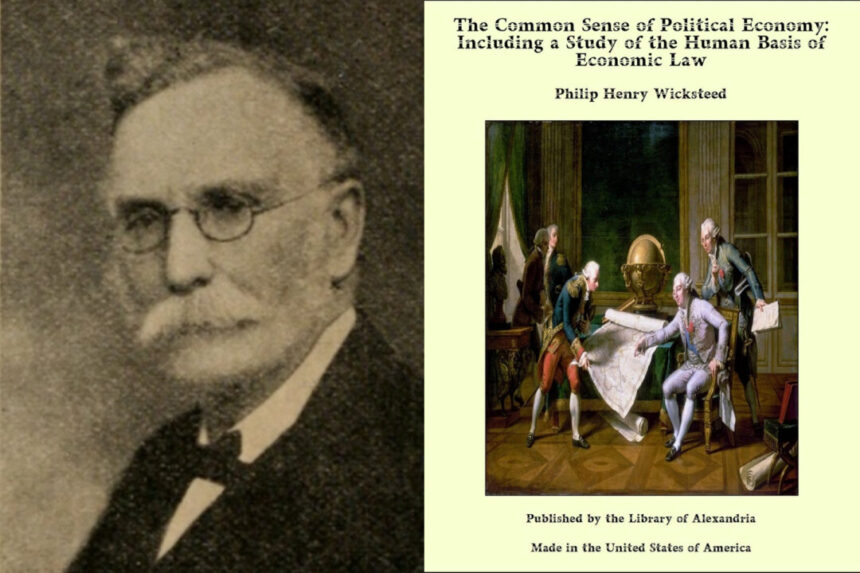Commentary
The book is “The Common Sense of Political Economy.” I read it for the first time a few years ago, and the importance of the book dawned on me. Here is a treatise on economics written at the dawn of the discovery of the great principle of modern economics: marginal utility.
It is as mighty and significant as Adam Smith’s “The Wealth of Nations” but better in many ways. It is not just a dusty old tome, but one that speaks directly to the great issues of our time. Its clarity exceeds any other presentation I’ve read. The author’s enthusiasm, even love, for the topic itself is obvious on every page. He is like a tour guide in a great castle who turns on lights in room after room and proceeds to explain everything in the room with precision and excitement. The reader can detect this in his prose.
Why does he put the phrase “common sense” in the title? There are two meanings. He sought to bring a certain unity to the opinions and debates within economics at the time. The principle of marginal utility had been written about and taught for several decades. It was the great discovery within economic theory in the last half of the 19th century, but only by 1900 had become the full consensus of the science itself. Wicksteed sought to make the marginalist way of thinking the “common” way.
The second way he uses the term is to capture the effect of marginalist thinking on the human mind. Once you get the principle, the functioning of the world becomes clearer to you. What was previously mysterious seems rather obvious. What had previously baffled you seems perfectly clear. The marginalist way of thinking becomes, in the most colloquial use of the phrase, “common sense.”
Wicksteed writes with the passion of a hobbyist (he was actually a Unitarian minister in “real life”) but with a precision that exceeded all the professional economists of his time. It still stands as the most elaborate, detailed, and extensive exposition of the idea ever written.
If you stick with his argument from the beginning to the end, your thinking will be permanently affected. You will see marginal utility all around, in every economic action. It will provide new ways of thinking of prices and resources and human behavior. You will have an impenetrable edifice against the fallacy of thinking of the value of whole classes of goods and services and instead see value as exclusively attached to the incremental choice of the acting person.
What is marginalism? It was the discovery that economic value extends from the incremental choice one unit at a time. Why does this matter? Let me give the nearest example at hand. I have a cup of coffee in front of me. I made it with a Keurig coffee maker. Each Keurig cup costs $1. Is that too much or too little? On the one hand, it is crazy expensive. I could pay $8 for a full can of coffee and make probably 40 cups and pay only 20 cents per cup.
Why don’t I do this? Because my choice is made at the margin. I’m not evaluating a whole stock of the good. I’m making my value judgments on just the one cup of coffee that I want to drink right now. This is the relevant unit, not some abstraction concerning how much coffee is at the store or on the ships coming from Africa or the whole stock of coffee growing in plantations all over the world. What matters to me in making the choice of whether the coffee is “worth it” in the cup right in front of me.
And this explains the enduring mystery of why people pay $7–$10 for a cup of coffee at Starbucks that they could make at home for a tiny fraction of that amount. All purchases are made at the margin: of the incremental good that is then available and not the entire class of goods in existence.
It’s the same with restaurants. It has surely occurred to you that you could make the same food at home for a fraction of the price. And the beer and wine, especially these days, is always priced wildly over what the same good would cost at the store. This is not a ripoff. Everyone knows this. The point is that people are paying not for the whole class of goods but the particular good at the restaurant, which includes the entire experience of being there.
This is why the profit margins of some goods are so high and some are so low. It depends on the intensity of demand that consumers have for the good at the moment of purchase. You might give up an appetizer or dessert because it is so expensive but a beer drinker will not give up his beer.
This is why price analytics that are purely based on cost can be so misleading. Yes, a competitive market will drive marginal cost and price to identity over the long term and in a perfect model.
In actuality, prices are determined at the point of sale, not based on abstract concepts outside of individual choices.
The classic puzzle addressed by marginal utility theory is why diamonds are more valuable in the market than water, despite water being essential for life. Marginalism explains that choices are made on the incremental unit, not on the overall value of goods. Water is typically more abundant than diamonds, leading to a higher value per unit for diamonds.
Marginalism also sheds light on other economic mysteries, such as pricing differences between movies and video games based on user utility at the point of decision-making, wage differentials between professions based on scarcity of services, and why certain businesses operate on holidays while others do not.
Additionally, marginalism helps explain concepts like opportunity cost, subjective value, diminishing marginal utility, and the relationship between cost and price. It provides insights into various aspects of human behavior and economic decision-making.
Furthermore, marginalism exposes flaws in certain policy ideas, like taxing unrealized gains in capital, which can lead to downward valuation of assets and undermine the principles of marginal utility.
Overall, Wicksteed’s exploration of marginalism offers a comprehensive understanding of economic reality and can shape one’s perspective on the world. His enthusiasm for the subject is evident in his writing, making his work both informative and engaging. Embracing marginalism can provide a practical framework for analyzing economic phenomena and decision-making processes. Please rewrite this sentence.
Source link







